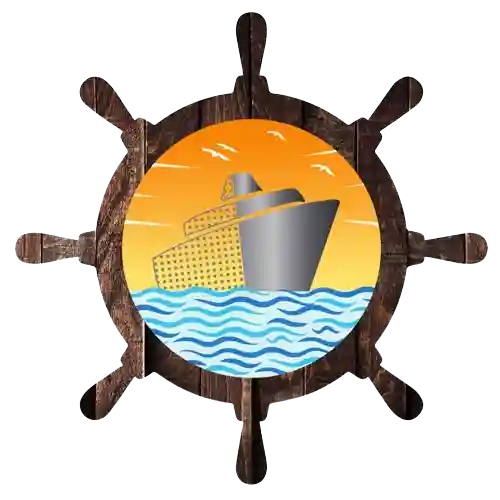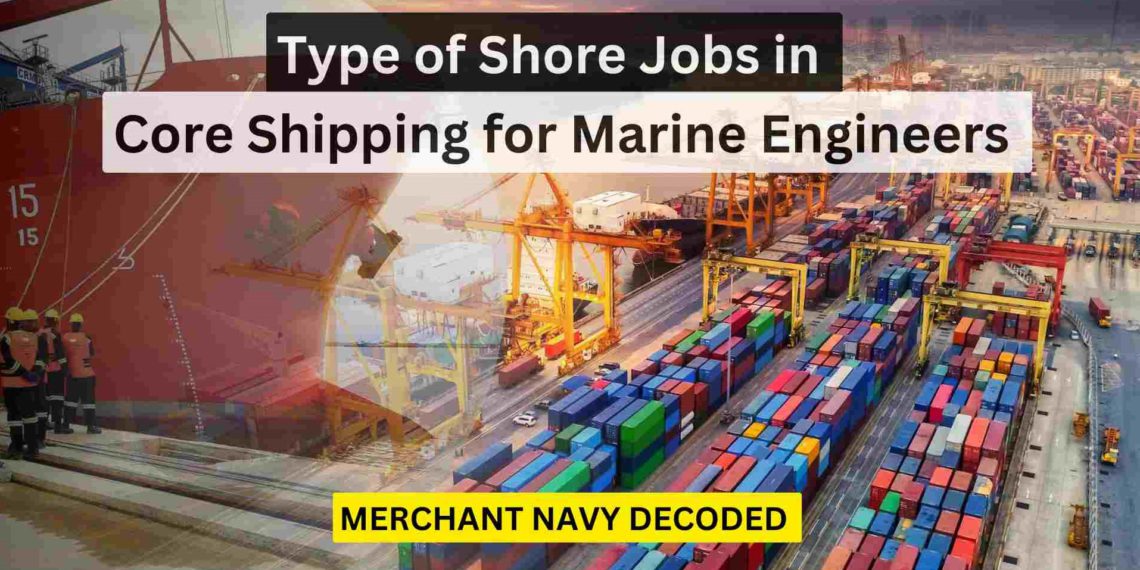Types of Shore Jobs in Core Shipping for Marine Engineers
Navigating Onshore Opportunities: A Guide for Engineers in the Core Shipping Industry
Overview:
- Explore Onshore Career Diversity: Discover the wide range of rewarding onshore career opportunities available for engineers in the shipping industry, and how technical skills contribute to the maritime sector.
- Operational vs. Management Roles: Differentiate between onshore operational and management positions, exploring their unique responsibilities and career paths, allowing engineers to align their roles with their goals.
- Shaping the Future of Maritime Onshore: Learn about onshore engineering roles, such as vessel optimization and maritime policy, and how engineers can apply their expertise to influence the shipping industry’s future.
A distinction between marine engineers: Scope of their duties
Although we often hear about the various ranks and roles within the merchant navy for marine engineers, what often goes unmentioned are the distinctions based on the level of responsibility, where they work (at sea or onshore), the certifications they hold, and the scope of their duties. Let’s explore how these factors set apart operational and management-level marine engineers in an engaging and straightforward manner.

Management level marine engineers, operational level marine engineers and trainee level engineers differ in their roles, responsibilities, and positions within the maritime industry. Here’s a breakdown of the key differences between the two:
Trainee Level Marine Engineers:
Trainee Marine Engineer:
A trainee marine engineer is an entry-level position in the maritime industry. They undergo a structured training program, gaining hands-on experience in maintaining and operating a ship’s machinery. As part of the engine department, they assist senior engineers, learn about engine systems, and ensure the vessel’s mechanical components function properly.
Fifth Engineer (5th Engineer):
A 5th engineer is typically the lowest-ranking officer in the engine department. They are responsible for routine maintenance, assisting in repairs, and operating machinery. Often considered a trainee or junior engineer, they work under the supervision of higher-ranking engineers and gain practical knowledge to advance in their career.
Operational Level Marine Engineers:
1. Responsibilities:
- Operational engineers typically work onboard ships or vessels.
- They are responsible for the day-to-day operation, maintenance, and repair of the ship’s machinery and systems.
- Tasks may include engine room maintenance, troubleshooting, and ensuring the vessel’s machinery functions efficiently.
2. Technical Focus:
- Operational engineers primarily focus on hands-on technical tasks, ensuring that the ship’s equipment and systems are operational and meet safety standards.
- Their work is crucial to keep the vessel running smoothly and safely during voyages.
Management Level Marine Engineers:
1. Responsibilities:
- Management level engineers work in onshore and onboard roles within shipping companies, regulatory bodies, or other related organisations.
- They oversee the technical aspects of vessel operations and are responsible for ensuring that ships meet safety, environmental, and operational standards.
2. Technical Focus:
- While they possess technical knowledge, management level engineers focus on managing technical operations, decision-making, and coordination.
- They may also engage in project management, inspections, and quality assurance.
Onshore Paths for Operational Level Engineers
Transitioning from an operational engineer to an onshore role opens up a world of opportunities. However, it’s important to note that the salary may not match the expectations due to factors such as certifications, experience, and specific job requirements. Management level engineers tend to be preferred over operational engineers in many roles due to their extensive experience, higher-level certifications, and a stronger skill set in management and leadership.
Core Shipping Jobs: Where Technical Skills are Required:
Assistant Technical Superintendent:
- Oversee Maintenance: Manage the maintenance and repair of vessel machinery and systems, ensuring compliance with safety standards.
- Collaborative Role: Work closely with onboard engineers and the shore-based team to ensure the vessel’s technical well-being.
Vessel Performance Optimization:
- Enhance Efficiency: Specialize in optimizing vessel performance, focusing on fuel efficiency and emissions reduction.
- Data-Driven Decision-Making: Utilize data analysis and technical expertise to fine-tune operational processes for improved efficiency.
Working with Manufacturers:
- Technical Expertise: Apply your engineering skills and knowledge to contribute to the development and improvement of maritime products and equipment.
- Quality Assurance: Play a key role in ensuring the manufacturing process aligns with the high standards required in the shipping industry.
Purchase Department:
- Procurement Expertise: Manage the procurement of essential spare parts, equipment, and materials, relying on your technical background to make informed purchasing decisions.
- Supply Chain Optimization: Streamline the supply chain to ensure the timely availability of critical components, contributing to the smooth operation of the vessel.
Offshore Dredging:
- Project Management: Participate in the planning, execution, and management of offshore dredging projects where engineering skills are essential.
- Ensuring Success: Apply your technical expertise to ensure the efficient and successful execution of dredging operations, supporting port development and maintenance.
Core Shipping Jobs: Where Technical Skills are Not as Much Required
Crewing:
- While predominantly the domain of deck officers, there are limited marine engineers in crewing roles.
- Involves managing and coordinating the crew members on board the vessel.
- Responsibilities include crew scheduling, HR functions, and ensuring compliance with maritime regulations for personnel.
Learning and Development – Interaction and Research:
- Focuses on developing training programs for seafarers and conducting research to enhance maritime knowledge.
- Engages operational engineers in fostering a culture of continuous learning and improvement within the maritime industry.
Safety and Quality Assurance:
- Operational engineers, while not the primary focus, are also welcome in safety and quality roles in the maritime industry.
- Responsibilities encompass implementing safety measures, conducting inspections, and ensuring adherence to quality standards to uphold the highest standards of safety and quality within the shipping company.
Onshore Paths for Management Level Engineers
When management level engineers decide to shift from onboard roles to onshore positions, it’s essential to manage salary expectations. While onshore salaries may initially be somewhat lower compared to onboard roles, the advantage lies in faster career advancement and a range of high-responsibility options. Management level engineers are valued for their extensive knowledge and experience, which can significantly impact the future of the maritime industry. Their expertise is sought after in roles involving policy-making, technical surveys, machinery sales, and even top-level administrative positions. So, while the initial compensation might not be as high, the opportunities for career growth and industry influence are certainly substantial.
Core Shipping Jobs: Where Technical Skills are Required
Technical Superintendent Roles:
- Technical superintendents oversee maintenance, repair, and safety of vessels, managing a team of experts.
- Their responsibilities encompass ensuring compliance with maritime regulations, optimizing vessel performance, and keeping vessels seaworthy.
Maritime Policy and Regulatory Roles:
- Management level engineers can shape the maritime industry’s future by working with maritime boards and regulatory bodies.
- They play a pivotal role in developing and implementing policies and standards to enhance safety, environmental compliance, and industry practices.
Sales and Purchase Positions:
- Engineers can contribute to sales and purchase departments, focusing on ship machinery, equipment, and optimization.
- They use their technical expertise to make informed decisions on equipment procurement, enhancing overall efficiency.
OEM (Original Equipment Manufacturer) Roles:
- In OEM companies, management level engineers are involved in developing, improving, and supporting maritime equipment and machinery.
- They contribute to product development and technical assistance, impacting the quality and efficiency of maritime products.
Dredging Operations:
- Management level engineers can lead dredging projects, which are vital for port development and maintenance.
- They utilize their engineering skills to ensure the successful execution of these complex and critical projects.
Shipyard and Vessel Construction:
- Playing a pivotal role in shipyard operations, management engineers oversee vessel construction, retrofits, and repair projects.
- Their technical knowledge ensures the quality and efficiency of the construction process and the final product.
Technical Surveys:
- Technical surveyors are responsible for conducting comprehensive inspections and assessments of vessels and maritime equipment.
- They ensure compliance with international regulations, safety standards, and assess the condition of ships and their components to maintain the highest levels of safety and operational efficiency.
Core Shipping Jobs: Where Technical Skills are Not as Much Required
A management level engineer possesses the versatility to transition into operational level engineer positions, if desired. Their extensive experience and higher-level certifications provide them with a strong technical foundation that can be applied effectively in operational roles, allowing them to navigate between the two career paths as needed. This flexibility is a testament to their comprehensive understanding of maritime engineering and management.

Port Security:
- Port security roles for management level engineers focus on overseeing security measures and strategies at ports.
- Responsibilities include the management of security teams, implementing security protocols, and ensuring the safety and integrity of port facilities and cargo.
Maritime Law:
- In the field of maritime law, management engineers may work in legal and compliance roles.
- They are responsible for interpreting and applying maritime laws and regulations, handling legal issues, and ensuring the company’s adherence to all legal requirements.
Chartering Manager:
- Chartering managers are primarily involved in the negotiation and management of contracts for chartering vessels.
- Their responsibilities include establishing charter rates, contract terms, and ensuring smooth chartering operations, requiring strong negotiation and organisational skills.
Port Operations:
- Port operation roles focus on the efficient management and coordination of various port activities.
- Responsibilities include overseeing vessel arrivals and departures, cargo handling, and ensuring that port operations run smoothly and efficiently, with a focus on logistics and management.
Conclusion

In the world of maritime engineering, the transition from operational to management level roles onshore opens up a multitude of opportunities. While salary expectations may need to be managed initially, the potential for career growth and influence within the industry is substantial. Management level engineers bring valuable expertise to roles involving policy-making, technical oversight, and high-responsibility positions.
In our upcoming blog posts, we’ll take a closer look at each of these onshore career paths in greater detail. We’ll also explore job opportunities outside the core shipping industry, revealing a wide array of options for engineers looking to broaden their horizons and make a significant impact in related fields. Stay tuned as we delve deeper into these exciting career prospects.
Now, you have the knowledge regarding the types of shore jobs in Core shipping but do you know the different types of opportunity awaiting for the Deck Officer in Shore jobs. If “no”, Click Here to know all the information.
Disclaimer :- The opinions expressed in this article belong solely to the author and may not necessarily reflect those of Merchant Navy Decoded. We cannot guarantee the accuracy of the information provided and disclaim any responsibility for it. Data and visuals used are sourced from publicly available information and may not be authenticated by any regulatory body. Reviews and comments appearing on our blogs represent the opinions of individuals and do not necessarily reflect the views of Merchant Navy Decoded. We are not responsible for any loss or damage resulting from reliance on these reviews or comments.
Reproduction, copying, sharing, or use of the article or images in any form is strictly prohibited without prior permission from both the author and Merchant Navy Decoded.


